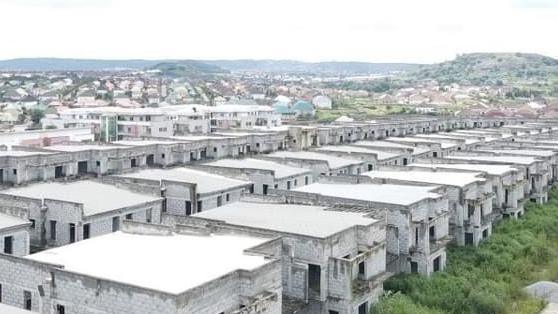Hundreds of Nigerian homes seized in huge anti-graft case

The anti-corruption agency says the homes were built with proceeds of corruption
- Published
Nigeria's anti-graft agency has said it has made its biggest ever seizure of assets, alleged to have been purchased with the proceeds of corruption.
The Economic and Financial Crimes Commission (EFCC) announced that it has taken possession of a large housing estate comprising of more than 750 properties in the capital, Abuja.
The agency did not reveal exactly who had owned the land and luxurious homes but its statement said they belonged to a former high-ranking member of government.
The EFCC was set up in 2003 to fight corruption in a country where it is seen as endemic, existing through all government structures.
“The forfeiture of the property... was [in line with the] EFCC’s mandate and policy directive of ensuring that the corrupt and fraudulent do not enjoy the proceeds of their unlawful activities,” the agency said.
Situated on the outskirts of Abuja, passers by have for years wondered who owned the estate covering some 150,000 square metres.
A property expert based in Abuja estimated that the seized assets would be worth tens of millions of dollars on the market.
Corruption remains one of the biggest problems in Nigeria despite succesive governments promising to stop it.
The country is one of the Africa's largest oil producers, but few of its more than 225 million inhabitants have benefited from this wealth.
At the moment there are several graft cases in court involving past or present government officials.
In May this year, a former minister of aviation, Hadi Sirika, appeared in court on corruption charges, along with his daughter and son-in-law.
Sirika was regarded as one of the most powerful ministers in former President Muhammadu Buhari's government.
The EFCC accused him of using his position to give undue advantage to a company linked to his daughter and son-in-law.
The three pleaded not guilty and were released on bail.
You may also be interested in

Go to BBCAfrica.com, external for more news from the African continent.
Follow us on Twitter @BBCAfrica, external, on Facebook at BBC Africa, external or on Instagram at bbcafrica, external